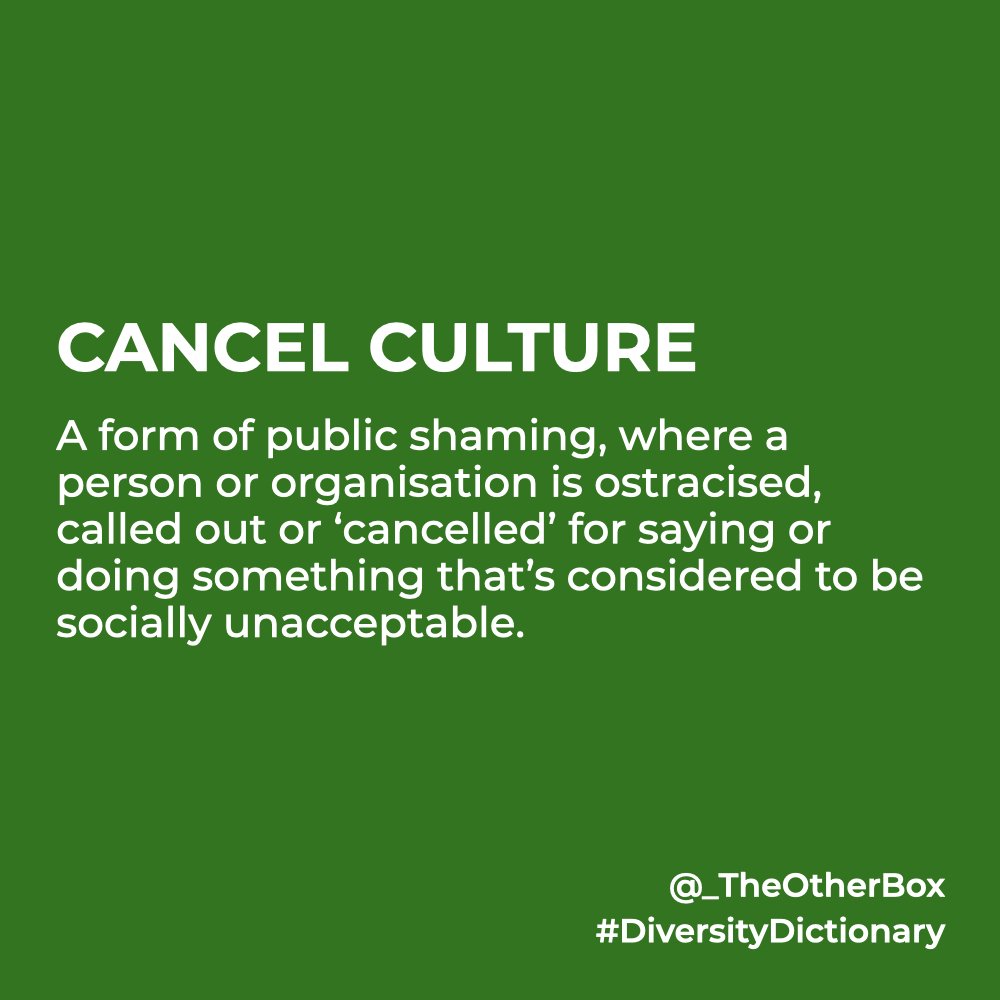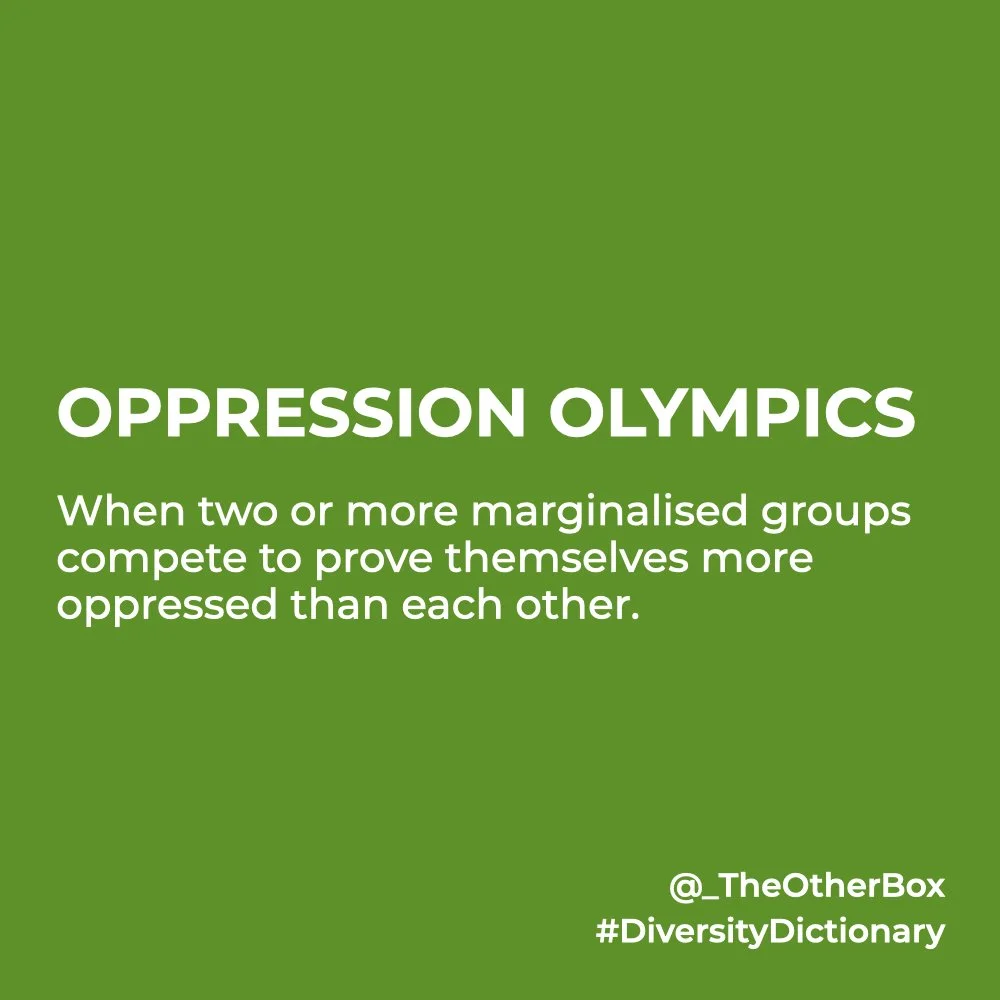Cancel culture, echo chamber, woke, oppression olympics. These are all terms that have gained popularity in the past five or so years, and while they may have started life as phrases intended to create a sense of unity, community or accountability, their effect is the opposite. They create division, derision and diversions from us all being able to make space for difference.
Read on to discover how these words have evolved and lost or gained potency.
CANCEL CULTURE
A form of public shaming, where a person or organisation is ostracised, called out or ‘cancelled’ for saying or doing something that’s considered to be socially unacceptable.
When someone is cancelled, they can lose friends, fans, followers, customers and other opportunities. Someone could be cancelled for saying something considered to be racist, sexist, homophobic, genderist, ableist, or any other way oppressive.
While people and organisations should absolutely be held accountable, take responsibility and be made to learn from their mistake when they say or do something problematic, cancelling is not a way to go about achieving this.
As a company we stand firmly against cancel culture. Shaming, blaming and placing judgement is not an effective way for individuals or organisations to learn. In fact, cancel culture only leads to further defensiveness, division and demonisation of people who hold different perspectives to our own. This is the antithesis of our mission to Make Space for Difference.
Cancel culture also deletes the fact that we are all capable of making mistakes and saying problematic things, because we are all brought up in the white-supremacist-cis-heteor-ableist-patriarchy. That means we all have work to do to examine and unlearn many things many things we are conditioned to assume is the default way to be.
People who champion cancel culture are holding others up to an impossible standard. This kind of perfectionism stands in the way of progress.
The consultant and writer Africa Brooke suggests taking time to look at people who make mistakes as human beings. Instead of attacking them with words and accusations, which will only lead them to feel defensive, she suggests trying to have a genuine conversation with them. Take the time to listen with an open mind, answer questions, and educate others. This has the power to change the narrative. (Source: Africa Brooke via Almost30)
ECHO CHAMBER
A social environment where a person only encounters information or opinions that reflect and reinforce their own, and they become closed off to differing beliefs.
Echo chambers have been closely linked with what’s known as confirmation bias, which describes our underlying tendency to notice, focus on, and accept evidence that fits with our existing beliefs. (source: @thedecisionlab)
In an age where we’re constantly bombarded with information, images, articles and headlines, both online and offline, it makes sense that we may default to our human autopilot tendency to seek out what feels safe and familiar. But echo chambers mean we’re less likely to engage in critical thinking when it comes to our sources of information.
Another defining feature of echo chambers is that we can end up distrusting everybody on the outside of the ‘chamber’. And that means that an insider’s trust for other insiders can grow unchecked. (Source: TheConversationDotCom)
The risk here can be that we demonise and dehumanise those who hold views different to our own, and we become completely closed off to hearing different perspectives or ever changing our minds.
This post is not about pointing the finger and saying echo chambers are ‘wrong’. When you’re from a marginalised background and community, there is great safety, solace and solidarity to be found in surrounding yourself with people who look like you who share similar beliefs, and protecting yourself from the inherent oppression and violence of the wh*te-s*premacist-cis-hetero-ableist-patriarchy.
Instead this post is about raising your awareness, so you can question – with curiosity, and without judgement – whether you might inadvertently be closing yourself off to views that are different to your own, and inadvertently dehumanising someone because of that.
It’s one of the ways we believe everyone can make space for difference: by actively counteracting the kind of polarisation that occurs with echo chambers, seeking out nuance, and seeing each others' humanity.
WOKE
The term ‘woke’ is used to describe a person who is alert to the racial and social injustices of the world.
It’s a term rooted in Black (American) culture and although it has been in use since the 1940s it rose in prominence in 2014, following the police killing of Michael Brown in Ferguson, Missouri, in the US. At the time, the phrase ‘stay woke’ was invoked by Black Lives Matter activists, warning people to be alert to racist police brutality.
Since then, the word (and what it represents) has warped and evolved, being co-opted, critiqued and rejected in equal measure.
While there are many alert and committed to the work of reversing social inequity, there are also many who use the phrase to magnify their moral standing and make performative action – like posting a black square on social media, or having a Black relative – appear to be deeply meaningful. This means that the term woke has come to be filled with a sense of irony.
Similarly, when corporations take surface level action for diversity, equity and inclusion in order to uphold their public reputation rather than create meaningful systemic change, it gets labelled as ‘woke-washing’. Think ‘green-washing’ for sustainability, or ‘pink-washing’ and ‘rainbow-washing’ during Pride Month 👀
‘Woke’ has also been weaponised by right-wing policy-makers as a way to create a sense of fear among those who seek comfort in the nostalgia of problematic phrases like ‘Make America Great Again’. This ‘war on woke’ sees people who care about social justice as a ‘nuisance’ and threat to civil society, which in turn trivialises the seriousness of systemic oppression.
In this way, woke is one of those words that might have begun as a way to raise awareness but has over time come to symbolise polarisation and superficial action. Understanding the evolution of a word like ‘woke’ can help us acknowledge labels and then move beyond them. Rather than describe someone or an idea as woke, it’s more helpful to accept that we all have work to do to unravel internalised tendencies, and that none of us could ever be ‘woke’ within our lifetimes.
Oppression olympics
When two or more marginalised groups compete to prove themselves more oppressed than each other.
The first recorded use of the phrase was by activist and author Elizabeth “Betita” Martínez in a 1993 conversation with activist Angela Davis.
In this conversation, Martínez responds to the question: “How can different people of color [sic] come together to build a coalition when their communities have different needs?” Her response begins: “First of all, we have to reject any hierarchy of needs of different communities.” Let’s unpack this:
Because of the way the white-s*premacist-cis-hetero-ableist-patriarchy operates, many marginalised groups are made to believe they must compete for limited resources and attention. That their oppression is more deeply felt than another group’s.
This gives rise to a scarcity mindset, leading to toxic ‘us-and-them’ comparison, an illusion of hierarchy of needs and pits different groups against each other.
Many people will have heard – and even said or thought to themselves – “Why do they get funding/attention while our needs get completely ignored? Don’t people see that we’re much worse off?”
While it’s important to acknowledge our differences, the varying and unique needs of different marginalised communities, and that systemic oppression plays out in a plethora of ways on each of us, defaulting to oppression olympics is not helpful. It upholds systemic oppression and puts up barriers to unity, solidarity, coalition and, ultimately, progress.
It can be challenging, even overwhelming to begin thinking about the many forms of oppression that affect different groups and people, and how to take positive action.
One place to begin is to simply catch yourself when you find the comparison script running through your head. And remember that: “Speaking out for one community does not mean the denial of another group’s oppression.”
Our mission at The Other Box is to make space for difference. Diversity Dictionary is where we explore meanings and histories of the language of diversity, beyond a dictionary definition, so we can all build a deeper awareness and critical understanding of perspectives that may be different to our own.
On all our social channels, we share weekly words and their definitions, with a different theme each month. These terms are a taster and have been taken from our Diversity Dictionary™ course in our TOB for Teams™ programme. If you'd like to learn more, check out our courses page and fill in the contact form.
Is there a theme you’d like to see covered in Diversity Dictionary? Let us know! Our work is co-created by our community to work towards creating a world that is more inclusive and safe for everyone.
Words by Roshni Goyate
Header image by Raghavendra V Konkathi on Unsplash




